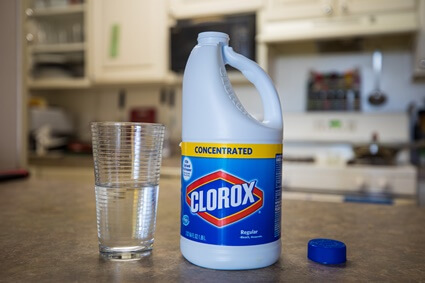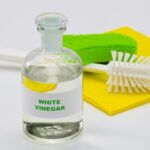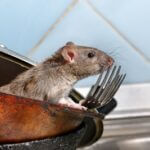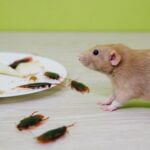Rats can be difficult to eliminate since they’re adaptable to many deterrents.
If given sufficient time, rats can overcome citrus smells and ignore the unpleasantness of tin foil. If you have a rat problem, you may be wondering if bleach is the best rodent deterrent.
Rats hate the smell of bleach, as the powerful scent of ammonia can burn their eyes and nose, making it difficult for them to stay near wherever this chemical is placed.
The smell isn’t only offensive but can have physical repercussions if inhaled for too long.
This makes bleach an effective way to drive rats away from your home and prevent them from returning. You can spread bleach around your home using a spray, foaming bleach, and bleach-soaked cotton balls.
Aside from deterring rats, bleach can be used as a rat poison alternative.
Is Bleach Effective Against Rats?
Bleach is an effective chemical against rats. According to Clinical Microbiology Reviews, as a disinfectant, bleach has been known to eliminate many viruses and bacteria, including those from rats.
When bleach comes into contact with proteins, it creates a chemical reaction that releases a strong smell. This strong, caustic odor is readily apparent to animals and humans alike.
The odor can be tolerable for humans, but rats have a stronger sense of smell. This makes the smell of bleach far more potent for rodents, turning it into an effective deterrent.
Bleach is also effective as rat poison because it’s corrosive, which means it comes into contact with proteins and breaks them down. Rats will die within days if they ingest the bleach.
Will The Smell of Bleach Keep Rats Away?
The smell of bleach keeps rats away because bleach doesn’t have to come into contact with the skin to cause issues. Simply inhaling the fumes can cause respiratory problems like coughing and nausea, so it’s recommended to only use bleach in well-ventilated areas.
For humans, inhaling bleach in small concentrations is considered safe. However, the threshold of safety for rats is much smaller because their bodies are smaller. That’s why rats will seek to avoid the smell of bleach, as it can damage their lungs.
Additionally, rats are more sensitive to the smell of bleach. Rats have evolved to have terrible eyesight since they spend most of their time in dark areas. However, they make up for this lack of sight by having a sharp sense of smell.
This makes bleach particularly effective against rats. Imagine how intense bleach smells to you. The bleach will be immediately repellent for a rat with a greater sense of smell.
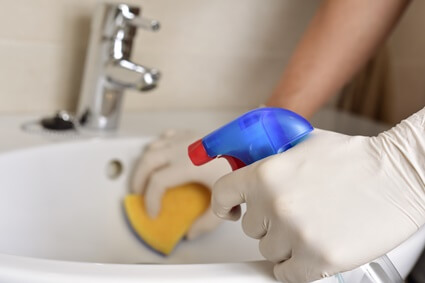
Is Bleach Poisonous To Rats?
Bleach can poison rats, much like it can humans, which means it can work as an alternative to rat poison.
Bleach can poison living organisms due to hypochlorous acid, which is the main component of bleach. According to Cell, bleach reacts with certain proteins, making it build up in the bacteria. Because of this build-up, cells cannot function, causing the organism to eventually die.
Can You Kill Rats With Bleach?
It may seem tricky to kill rats with bleach. After all, rats will want to avoid the smell of bleach, and you can’t expect rats to come up to a bowl and drink from it. However, it’s possible to mask the smell of bleach and get rats to ingest it.
A common way to do this is by using peanut butter. Because of its oily consistency, the smell of peanut butter is very strong. Peanut butter is attractive to rats, making it the perfect bait.
To create this peanut butter trap, take about 1 tablespoon of bleach. Then, slowly add the peanut butter, 1 teaspoon at a time. Continue adding until you cannot smell the bleach anymore.
Alternatively, you can use powdered peanut butter. This is a great way to keep the peanut butter from becoming too runny while still keeping the peanut butter’s odor strong.
Bleach Solution for Rats
The CDC recommends mixing 1 part bleach with 10 parts water to clean up after rodents. However, the CDC also recommends following any instructions that manufacturers may have.
Create A Spray
The easiest way of applying bleach is through a spray. You can buy bleach that’s already in spray bottles. However, you can also place the bleach solution you made inside a spray bottle.
Foaming Bleach
Foaming bleach is another common alternative to spray bottles. You can also create bottles by placing the solution in a foaming bottle.
This method isn’t the best for disinfecting large areas, which is why it’s not recommended for houses with large infestations.
However, foaming bleach is an excellent choice for sealing exits and entrances. It is also the best way to avoid spreading the smell of bleach all over your home, as the smell will only be concentrated in the areas where the foam was applied. Compare this to sprays, which tend to mist the air with bleach.
Use Cotton Balls
A final method of distributing bleach is soaking cotton balls in the bleach solution and leaving them around your home.
This can be a more tedious way of getting bleach around the home. However, like foaming bleach, cotton balls tend to concentrate the smell of bleach in smaller areas.
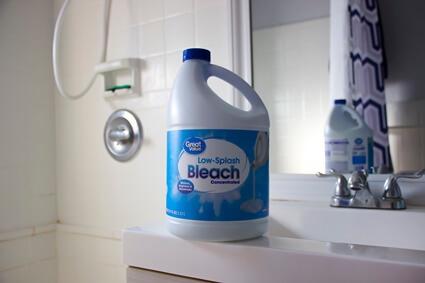
How To Get Rid Of Rats With Bleach?
Bleach is a great way to prevent rats from entering your walls and basement in the first place. However, if you already have rats in your home, bleach can also be used to drive them out.
You need to add bleach to the following:
All Exits But One
No matter the method you use to distribute the bleach, your priority is to apply the chemical to any exits. Identify the areas where rats may be hiding, such as holes they have made in the walls or openings through wire doors. Here’s where you should spread bleach generously.
However, keep at least one exit from each area, preferably one that will lead outside the home. This will ensure that rats are driven out instead of being trapped inside.
Uncontaminated Entry Points
It is also a good idea to put bleach in other possible openings.
After spraying exits, rats driven out can easily find other places to frequent. Avoid these by spraying or fixing possible entrances, like cracks in the wall and gaps between doors.
Areas Where Rats Frequent
Then, make sure to add bleach to areas where rats are frequent.
For particularly serious infestations, you may have already seen where rats often gather in your home. Otherwise, you can find frequented spaces by looking for rat droppings.
Rat Nests
Disinfect the rat nests. Rat nests will be made out of scraps found around the house. Common building materials include tissues, papers, and bits of wood. You will also find bits of food around the nests and a lot of rat droppings. Be sure to remove this nest and completely disinfect the area.
Rats hate the smell of bleach, especially in large concentrations. Using this to your advantage, you can direct where rats go and eventually drive them out.
Here are some other smells that rats hate.

